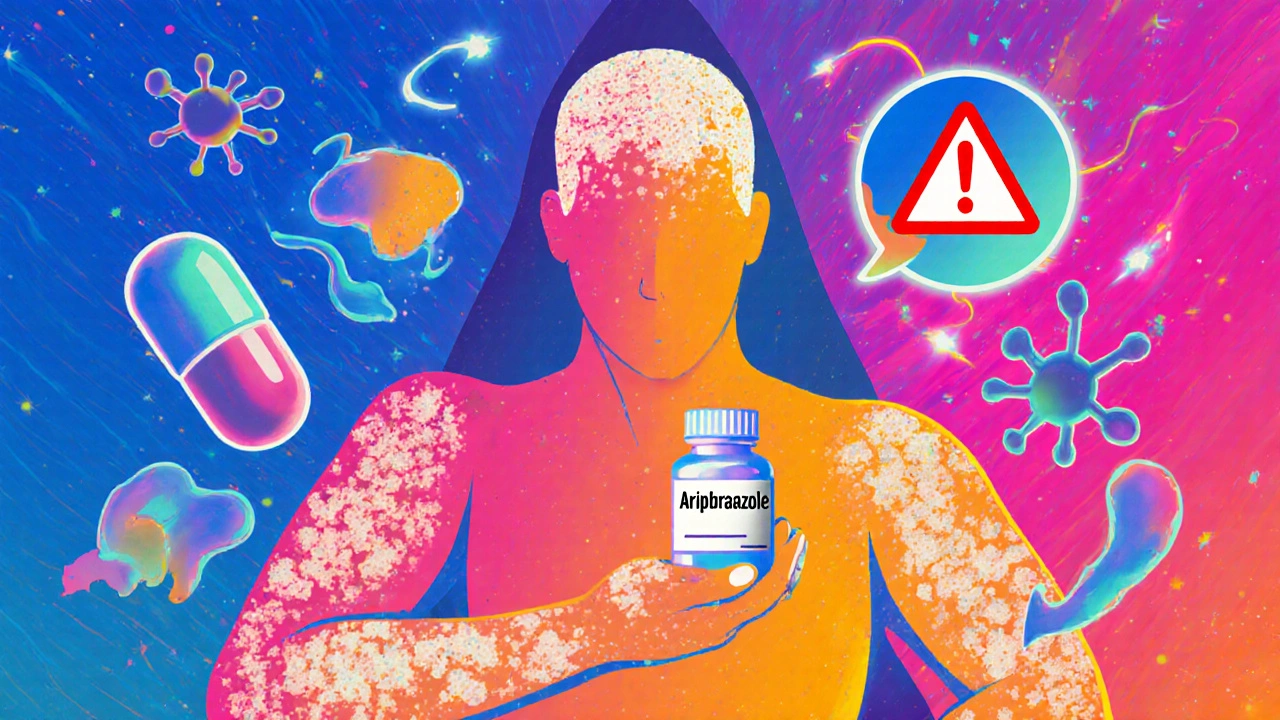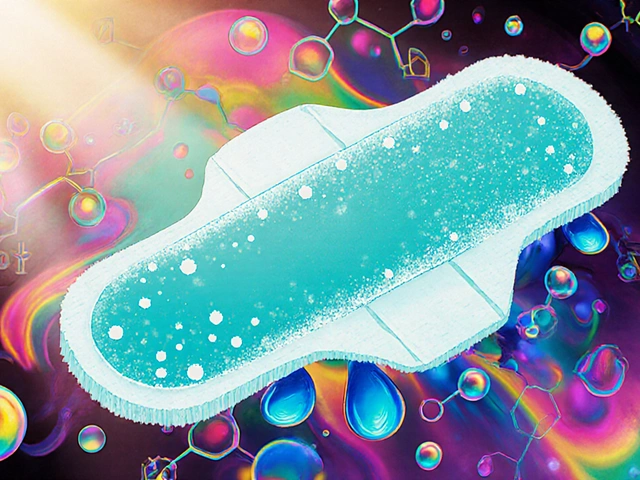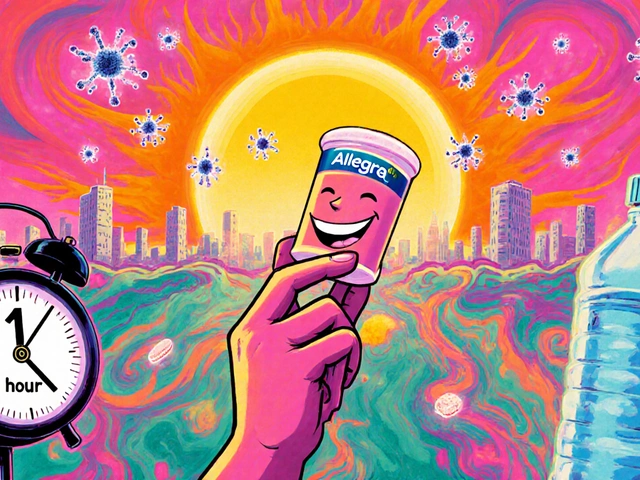Most people know aripiprazole as a drug for schizophrenia, bipolar disorder, or depression. But if you’re living with psoriasis and have been prescribed aripiprazole for a mental health condition, you might be wondering: could this medication be helping-or worsening-your skin?
The short answer? There’s no solid evidence that aripiprazole treats psoriasis. But there’s growing data showing it can trigger or flare psoriasis in some people. That’s not just a side effect-it’s a clinically recognized phenomenon.
What Is Aripiprazole?
Aripiprazole is an atypical antipsychotic medication used to treat schizophrenia, bipolar I disorder, major depressive disorder (as an add-on), and irritability associated with autism. It works by balancing dopamine and serotonin levels in the brain, acting as a partial agonist at dopamine D2 receptors.
It’s sold under brand names like Abilify, Aristada, and others. Unlike older antipsychotics that block dopamine completely, aripiprazole fine-tunes it-sometimes reducing side effects like weight gain or sedation. That’s why doctors often choose it over alternatives.
But this balancing act doesn’t just affect the brain. Dopamine and serotonin are also involved in immune signaling and skin inflammation. That’s where things get complicated for people with psoriasis.
What Is Psoriasis?
Psoriasis is a chronic autoimmune condition where the immune system mistakenly attacks healthy skin cells, causing them to grow too fast and build up into thick, scaly patches. It affects about 2-3% of the global population.
Common types include plaque psoriasis (raised red patches with silvery scales), guttate psoriasis (small dot-like lesions), and inverse psoriasis (smooth red patches in skin folds). It’s not contagious, but it’s painful, itchy, and often linked to other conditions like depression, anxiety, and metabolic syndrome.
Standard treatments include topical steroids, phototherapy, and biologics like adalimumab or secukinumab. These target specific parts of the immune system-like TNF-alpha or IL-17-that drive inflammation.
Could Aripiprazole Cause Psoriasis Flares?
Yes. Multiple case reports and studies confirm that aripiprazole can trigger new-onset psoriasis or worsen existing disease.
A 2021 review in the Journal of the American Academy of Dermatology analyzed 17 published cases where patients developed psoriasis after starting aripiprazole. In 14 of them, symptoms appeared within 2-8 weeks. In 11 cases, the psoriasis improved or cleared after stopping the drug.
One patient, a 42-year-old man with bipolar disorder, developed severe plaque psoriasis on his scalp, elbows, and knees two months after starting aripiprazole. His lesions didn’t respond to topical steroids. When his doctor switched him to quetiapine, his skin cleared in six weeks.
Another case involved a 58-year-old woman with depression. Within three weeks of starting aripiprazole, she developed widespread pustular psoriasis. Her dermatologist ruled out infection and other triggers. After discontinuing the drug, her skin normalized in eight weeks.
Why does this happen? Researchers think aripiprazole’s effect on dopamine receptors in the skin may alter immune cell behavior. Dopamine receptors are found on T-cells, keratinocytes, and mast cells-all key players in psoriasis. Even small shifts in dopamine signaling might push the immune system into overdrive.

Is There Any Evidence It Helps Psoriasis?
No. There are no clinical trials showing aripiprazole improves psoriasis. No peer-reviewed studies suggest it reduces PASI scores (a standard measure of psoriasis severity). No dermatology guidelines list it as a treatment option.
Some patients report feeling less stressed after starting aripiprazole-and stress is a known psoriasis trigger. That might make their skin seem better. But that’s an indirect effect. It’s not the drug fixing the immune dysfunction. It’s just reducing a trigger.
Compare that to actual psoriasis treatments. Biologics like ustekinumab reduce PASI scores by 75% or more in over half of patients within 12 weeks. Aripiprazole doesn’t come close.
Who’s at Risk?
Not everyone on aripiprazole gets psoriasis. But certain people are more vulnerable:
- Those with a personal or family history of psoriasis or other autoimmune diseases
- Patients with high stress levels or recent emotional trauma
- People taking other drugs that can trigger psoriasis, like lithium or beta-blockers
- Those with obesity or metabolic syndrome-conditions linked to both psoriasis and mental illness
If you’ve never had psoriasis before and start aripiprazole, keep an eye on your skin for the first two months. Watch for red, scaly patches, especially on the scalp, elbows, knees, or lower back.
What Should You Do If You Notice Skin Changes?
Don’t stop aripiprazole on your own. Abruptly stopping antipsychotics can cause withdrawal psychosis, rebound depression, or severe anxiety.
Instead:
- Take clear photos of any new skin lesions.
- See your dermatologist for a proper diagnosis-psoriasis can look like eczema, fungal infections, or drug rashes.
- Tell your psychiatrist about the skin changes. Bring your photos.
- Ask if switching to another antipsychotic is possible. Quetiapine, olanzapine, and risperidone have lower reports of psoriasis triggers.
- If switching isn’t safe, your doctors can manage the psoriasis with standard treatments while keeping you on aripiprazole.
In some cases, dermatologists and psychiatrists work together to find a balance-using topical treatments or low-dose phototherapy to control skin symptoms while keeping mental health stable.

Alternatives to Aripiprazole for Mental Health
If psoriasis is flaring and you’re on aripiprazole, your doctor might consider alternatives with fewer skin risks:
| Drug | Psoriasis Risk | Common Use | Notes |
|---|---|---|---|
| Aripiprazole | High | Schizophrenia, bipolar, depression | Strongest link to triggering psoriasis |
| Quetiapine | Low | Bipolar, depression, insomnia | Often preferred when skin issues arise |
| Olanzapine | Moderate | Schizophrenia, bipolar | Can cause weight gain, which may worsen psoriasis |
| Risperidone | Low | Schizophrenia, autism | Minimal reports of skin flares |
| Lithium | High | Bipolar disorder | Known psoriasis trigger-avoid if you have skin disease |
Quetiapine is often the top choice when psoriasis is a concern. It’s effective for mood stabilization and has far fewer reports of skin reactions. Olanzapine works well too, but its weight gain side effect can make psoriasis harder to manage.
Why This Matters Beyond Skin
Psoriasis isn’t just a skin condition. It’s linked to heart disease, diabetes, depression, and reduced life expectancy. If a drug meant to help your mental health ends up worsening your physical health, that’s a serious trade-off.
Many patients with bipolar disorder or treatment-resistant depression also have undiagnosed psoriasis. When their mood improves on aripiprazole, they may not realize their skin is getting worse-until the itching and pain become unbearable.
Doctors need to screen for skin changes as part of routine monitoring, just like checking weight or blood sugar. Mental health treatment shouldn’t come at the cost of skin health.
Final Thoughts
Aripiprazole doesn’t treat psoriasis. In fact, it can make it worse. If you’re on this medication and notice new or worsening skin patches, talk to your doctors right away. Don’t assume it’s just stress or dry skin.
The good news? There are other antipsychotics that won’t trigger your skin. And psoriasis is treatable-even if you’re on long-term psychiatric medication. With the right team-psychiatrist, dermatologist, and you-you can manage both your mind and your skin.
There’s no one-size-fits-all solution. But awareness is the first step. If you’re taking aripiprazole and have psoriasis-or a family history of it-ask your doctor: "Could this drug be affecting my skin?"
Can aripiprazole cause psoriasis to get worse?
Yes. Multiple clinical case reports show that aripiprazole can trigger new-onset psoriasis or cause existing psoriasis to flare. Symptoms often appear within weeks of starting the drug and improve after stopping it. This is a recognized, though not common, side effect.
Is there any evidence aripiprazole helps psoriasis?
No. There are no clinical trials, guidelines, or peer-reviewed studies showing aripiprazole improves psoriasis symptoms. While some patients feel less stressed on the drug-which might indirectly help skin-this is not the same as treating the underlying autoimmune condition.
What should I do if I develop psoriasis while taking aripiprazole?
Don’t stop the medication on your own. Contact your psychiatrist and dermatologist. Take photos of the lesions and discuss switching to another antipsychotic like quetiapine or risperidone, which have lower risks of triggering psoriasis. In the meantime, your dermatologist can start standard psoriasis treatments like topical steroids or phototherapy.
Are there safer antipsychotics for people with psoriasis?
Yes. Quetiapine and risperidone have the lowest reported rates of psoriasis flares. Olanzapine is an option but may worsen psoriasis through weight gain. Avoid lithium and aripiprazole if you have a history of psoriasis or autoimmune disease.
How common is psoriasis triggered by aripiprazole?
It’s rare but underreported. Studies estimate fewer than 1 in 1,000 patients develop psoriasis from aripiprazole. But because many cases go unreported or misdiagnosed, the real number may be higher. Anyone with a personal or family history of autoimmune skin disease should be monitored closely.





Jennifer Walton
November 16, 2025 AT 11:12Aripiprazole doesn't cure psoriasis. It just shifts the balance-sometimes too far. Dopamine isn't just for mood. It's in the skin too. And when you mess with it, the body reacts.
Kihya Beitz
November 17, 2025 AT 06:05Oh wow, a drug that makes your skin look like a dragon laid eggs? Groundbreaking. Next they'll tell us coffee causes existential dread.
Diane Tomaszewski
November 18, 2025 AT 11:54I think people forget that the brain and skin are connected. Not just by nerves but by the whole immune system. When one goes off, the other pays the price. It's not magic. It's biology.
Rachel Wusowicz
November 18, 2025 AT 22:30Did you know the pharmaceutical industry funds half the dermatology studies? They don't want you to know that aripiprazole is just a cover for deeper manipulation-dopamine control is a gateway to population regulation. The skin flares? That's the body screaming. They silence it with steroids. Then they sell you more pills. Watch the timeline... it's all synced.
David Rooksby
November 19, 2025 AT 09:04Look, I've been on this stuff for six years and my psoriasis went from mild scalp flakes to full-on plaque armor on my elbows. I thought it was stress. Turns out my psychiatrist didn't even know this was a documented side effect. I had to google it myself. And now they want me to switch to quetiapine? That thing makes you sleep through your own funeral. I'm stuck between a rock and a hard place-mental stability or skin that looks like I lost a fight with a cheese grater. Neither option is good.
Melanie Taylor
November 20, 2025 AT 02:06OMG YES THIS!! 😭 I started aripiprazole and my skin went from okay to ‘why is everyone staring’ in 3 weeks. My derm was like ‘this looks like psoriasis’ and I was like ‘but I’ve never had it before!’ 😅 So glad someone finally put this out there. My doc didn’t even blink. 🙄
Teresa Smith
November 21, 2025 AT 04:16This is a critical intersection of mental and physical health that is too often ignored. Patients deserve coordinated care. A psychiatrist prescribing a medication that exacerbates a chronic autoimmune condition without monitoring skin health is negligent. Collaboration between specialties isn’t optional-it’s ethical. Patients are not siloed. Their care shouldn’t be either.
ZAK SCHADER
November 21, 2025 AT 12:38Who even wrote this? Some pharma shill trying to scare people off aripiprazole? I've been on it for 4 years and my skin is fine. You people are just looking for reasons to blame meds. Maybe you're just lazy and don't wash your face.
Danish dan iwan Adventure
November 22, 2025 AT 21:56DA2 partial agonism → altered keratinocyte apoptosis → IL-23/Th17 axis dysregulation. Classic immunopharmacological cascade. Case reports ≠ evidence. Need RCTs.
Ankit Right-hand for this but 2 qty HK 21
November 24, 2025 AT 18:54Typical western whining. In India we take antipsychotics and still work 12 hour shifts. You people think your skin is more important than your mind? Pathetic. Just deal with it. No one cares about your eczema.
Oyejobi Olufemi
November 26, 2025 AT 16:28Let me be clear: this isn't about aripiprazole-it's about the systemic failure of Western medicine to treat the whole person. The brain-skin axis is real, but no one wants to admit that psych meds are just chemical bandaids on a society that's collapsing. You think your psoriasis is bad? Try living in a world where your worth is measured by productivity, not peace. They gave you a drug to numb your pain, then blamed you for the scars. Wake up.